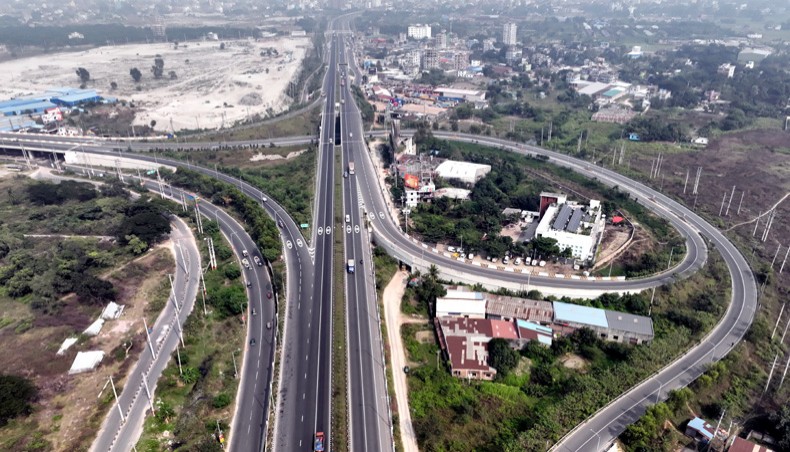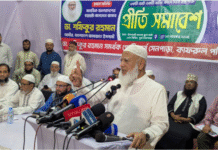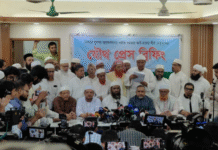
Dhaka-Mawa expressway takes a deserted look in Keraniganj area near the capital on Wednesday during the blockade called by the opposition camp for national election under a non-party caretaker government. — Sony Ramany
The first day of the sixth round of the 48-hour countrywide blockade programme called by the main opposition Bangladesh Nationalist Party and its allies was enforced on Wednesday amid attacks, violence, and arrests.
BNP, Bangladesh Jamaat-e-Islami, the Liberal Democratic Party, Ganatantra Mancha, Gono Odhikar Parishad, and other partners of the ongoing simultaneous movement brought out processions at places across the country.
New Age correspondent in Feni reported that the Juba League, the youth front of the ruling Awami League, carried out an attack on Jatiyatabadi Chhatra Dal, the student wing of the BNP, while they brought out a procession in favour of the blockade on Tuesday night.
Addressing a virtual press conference, BNP senior secretary general Ruhul Kabir Rizvi said that more than 515 leaders and activists of the BNP had been arrested in the past 24 hours.
He said that alongside arresting and conducting night-time raids at the houses of BNP leaders and activists by police, ruling party activists were attacking BNP people and their houses.
He said that prime minister Sheikh Hasina was now desperate to conduct a farcical election with the so-called King’s Party.
‘Leaders are being pressured and intimidated to join these so-called king’s parties,’ he alleged.
‘Since the people of the country rejected this farce election schedule, Sheikh Hasina has now become desperate to stage a farce election by creating the so-called King’s Party and little-known parties. Agencies have been fielded to form the so-called King’s Party. Bargaining is going on like a cow market to buy leaders from different parties,’ he said.
He said that many patriotic leaders were being pressured, lured, and intimidated to join the King’s Party of the Awami League government.
Mentioning that there is a fear of arrests in every town-village-town-city-port of the country, Rizvi said, ‘the helmet forces are selectively attacking, vandalising, and looting the houses of the activists active in the anti-government movement.’
He also said that by conducting secret attacks and bombings, the pro-democracy activists were being tortured and handed over to the police.
A limited number of long-route buses were seen operating on the first day of the sixth-phase blockade, though the operation of the long-route buses almost stopped during the previous five spells of the blockade.
Besides, a good number of public transport were seen on the city streets of the capital, but the numbers of passengers were lower compared to regular time.
The presence of people in different parts of the capital also increased compared to previous blockades by opposition parties.
During visits to bus terminals in the capital, it was seen that a limited number of buses were operating on the long route, but the number of passengers was low due to the blockade.

Eagle transport ticket seller Mohammad Ali at Gabtoli bus terminal said that they were operating buses on the Dhaka-Khulna and Dhaka-Satkhira routes amid the blockade.
Some buses, including Sarbick Paribahan, Tisha Paribahan, Eagle Paribahan, and BMF Paribahan, were seen operating from the Sayedabad bus terminal, but the number of passengers was lower compared to regular time.
A few buses from Ena and Sonar Bangla Paribahan were seen leaving from the Moakhali bus terminal for Mymensingh and Netrakona amid the blockade.
Sonar Bangla Paribahan ticket seller Md Feroz said, ‘We did not get passengers during the previous blockades, but today [Wednesday] some passengers came to the terminal, so we are operating the bus.’
However, a number of bus counters at Moakhali, Gabtoli, and Sayedabad bus terminals were found closed as they did not operate the bus amid a lack of passengers and fear of arson attacks during the blockade.
A number of inter-district buses were also seen parked at the key terminals in the capital.
Launches from the Sadarghat launch terminal also operated with a lower number of passengers compared to regular times.
All trains, however, ran on schedule, but the number of passengers was slightly lower compared to regular days, said Masud Sarwar, station master at Kamalapur Railway Station.
A good number of members of law enforcement agencies were seen patrolling roads, in and around bus terminals, and on highways to ensure security.
New Age









